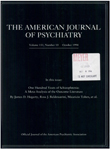Symptoms of PTSD in 124 survivors of the Holocaust
Abstract
OBJECTIVE: Survivors of the Holocaust are expected to be at risk for posttraumatic stress disorder (PTSD), but few empirical data are available. This study investigated PTSD symptoms in Holocaust survivors with well-documented exposure to trauma. METHOD: The German files of 124 Jewish Holocaust survivors who were judged to be free from bipolar affective disorder, obsessive-compulsive disorder, and organic brain syndrome were selected from those of 145 applicants to West German compensation boards. The psychiatric assessments were reexamined for explicit descriptions of current PTSD symptoms according to the DSM-III- R diagnostic criteria. A subgroup of 20 Auschwitz survivors with tattooed identification numbers were also compared with the 45 survivors who had not been in concentration camps. RESULTS: Sixty-three percent of the total sample had been detained in concentration camps, and an average of 78% of their first-degree relatives were reported killed in the Holocaust. Forty-six percent of the total sample met the DSM-III-R criteria for PTSD. The most common symptoms were sleep disturbance, recurrent nightmares, and intense distress over reminders. The tattooed Auschwitz survivors had significantly more symptoms and were three times more likely to meet diagnostic criteria for PTSD than the survivors who had not been in concentration camps. CONCLUSIONS: The results suggest a greater risk of chronic PTSD in survivors who were exposed to atrocities. Most survivors had not received adequate psychiatric care.
Access content
To read the fulltext, please use one of the options below to sign in or purchase access.- Personal login
- Institutional Login
- Sign in via OpenAthens
- Register for access
-
Please login/register if you wish to pair your device and check access availability.
Not a subscriber?
PsychiatryOnline subscription options offer access to the DSM-5 library, books, journals, CME, and patient resources. This all-in-one virtual library provides psychiatrists and mental health professionals with key resources for diagnosis, treatment, research, and professional development.
Need more help? PsychiatryOnline Customer Service may be reached by emailing [email protected] or by calling 800-368-5777 (in the U.S.) or 703-907-7322 (outside the U.S.).



